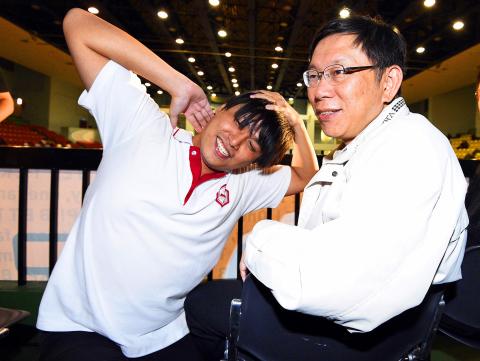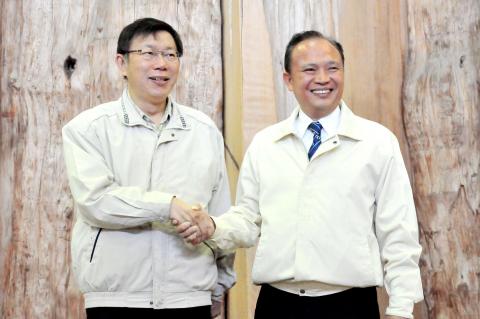Independent Taipei mayor-elect Ko Wen-je (柯文哲) yesterday triggered controversy when he said after a meeting with Yilan County Commissioner Lin Tsung-hsien (林聰賢) that a planned rail line connecting Taipei and Yilan should take the shortest route possible to save time, even though the that plan had been rejected over ecological and environmental concerns.
“Commissioner Lin and I touched on the issue of the planned new rail line between Taipei and Yilan during the meeting, and we both agreed that the rail line should take the shorter route,” Ko said after the hour-long talks at Yilan County Hall yesterday morning.
“Of course, environmental impacts are an issue, but we will leave them to be solved by the professionals,” he added.

Photo: Chen Chih-chu, Taipei Times
Ko added that if the environmental issues could be solved, then the shorter route should be chosen.
The shorter route — or “route A”— was an option when the government earlier considered constructing a direct line between Taipei and Yilan to solve traffic problems.
However, since route A would pass through an ecologically sensitive area near the Fetsui Reservoir (翡翠水庫) that supplies water to Taipei and part of New Taipei City, it was rejected.

Photo: CNA
Instead, “route B” — a curved path avoiding the area — was chosen. Route B would add 14 minutes to the trip.
Elaborating on the issue later in Taipei, Ko said that he and Lin prefer route A because of the time it could save.
“The public’s time should be an important factor to consider,” Ko said. “If route A could save 14 minutes for a traveler, and if there are 10,000 travelers taking the train a day, you would be surprised to see how much time is saved.”
He said that the route chosen by the central government was “dodging the environmental issue.”
“We should look for a way to succeed, not excuses for failure,” Ko said. “The decision [to take route B] is dodging the environmental issue; we should first try to see if the environmental issues could be solved. If they can, then we should of course choose route A. If they cannot, then we would go to route B.”
When asked whether he would accept route B if he finds that the environmental issues cannot be solved, Ko said: “We should try very hard to see if we can find a solution when we run into a problem.”

The combined effect of the monsoon, the outer rim of Typhoon Fengshen and a low-pressure system is expected to bring significant rainfall this week to various parts of the nation, the Central Weather Administration (CWA) said. The heaviest rain is expected to occur today and tomorrow, with torrential rain expected in Keelung’s north coast, Yilan and the mountainous regions of Taipei and New Taipei City, the CWA said. Rivers could rise rapidly, and residents should stay away from riverbanks and avoid going to the mountains or engaging in water activities, it said. Scattered showers are expected today in central and

People can preregister to receive their NT$10,000 (US$325) cash distributed from the central government on Nov. 5 after President William Lai (賴清德) yesterday signed the Special Budget for Strengthening Economic, Social and National Security Resilience, the Executive Yuan told a news conference last night. The special budget, passed by the Legislative Yuan on Friday last week with a cash handout budget of NT$236 billion, was officially submitted to the Executive Yuan and the Presidential Office yesterday afternoon. People can register through the official Web site at https://10000.gov.tw to have the funds deposited into their bank accounts, withdraw the funds at automated teller

COOPERATION: Taiwan is aligning closely with US strategic objectives on various matters, including China’s rare earths restrictions, the Ministry of Foreign Affairs said Taiwan could deal with China’s tightened export controls on rare earth metals by turning to “urban mining,” a researcher said yesterday. Rare earth metals, which are used in semiconductors and other electronic components, could be recovered from industrial or electronic waste to reduce reliance on imports, National Cheng Kung University Department of Resources Engineering professor Lee Cheng-han (李政翰) said. Despite their name, rare earth elements are not actually rare — their abundance in the Earth’s crust is relatively high, but they are dispersed, making extraction and refining energy-intensive and environmentally damaging, he said, adding that many countries have opted to

PEACE AND STABILITY: Maintaining the cross-strait ‘status quo’ has long been the government’s position, the Ministry of Foreign Affairs said Taiwan is committed to maintaining the cross-strait “status quo” and seeks no escalation of tensions, the Ministry of Foreign Affairs (MOFA) said yesterday, rebutting a Time magazine opinion piece that described President William Lai (賴清德) as a “reckless leader.” The article, titled “The US Must Beware of Taiwan’s Reckless Leader,” was written by Lyle Goldstein, director of the Asia Program at the Washington-based Defense Priorities think tank. Goldstein wrote that Taiwan is “the world’s most dangerous flashpoint” amid ongoing conflicts in the Middle East and Russia’s invasion of Ukraine. He said that the situation in the Taiwan Strait has become less stable